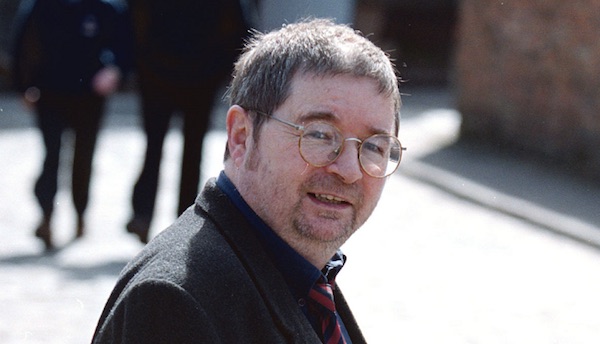
Pressure is growing over conflict killings in which informers are implicated after the Office of the Police Ombudsman was accused of consistently protecting those involved.
A vigil was held on Tuesday for Sunday World journalist Martin O’Hagan (pictured), who was killed by a loyalist murder gang, believed to have included informers.
Mr O’Hagan was shot dead while walking to his Lurgan home with his wife, Marie, on September 28, 2001. At the time, the then British Direct Ruler John Reid, said it was a `barbaric’ killing and vowed that those responsible would be tracked down. Instead, almost nothing was done.
Former colleagues, friends and supporters of the well known journalist gathered outside the offices of the Police Ombudsman on Tuesday to protest on the anniversary.
From a republican background, Mr O’Hagan served seven years in the 1970s for his role in the Official IRA campaign in the Lurgan area, before turning to journalism. He became a high profile reporter on the activities of loyalist paramilitary groups over many years.
Despite receiving threats, Mr O’Hagan continued to live in the town of Lurgan until he was assassinated by a Loyalist Volunteer Force gang in brutal circumstances.
The names of his alleged killers began to circulate almost immediately, and it was clear that some were informers who had connections to both the RUC police and the British Army. Four men appeared in court over Mr O’Hagan’s killing in 2008, but they denied involvement and the charges were dropped two years later with no further murder prosecutions ever following.
Robin Wilson, chairman of the NUJ in Belfast, voiced concern at the vigil that no-one has been brought to justice for the murder.
“To us that’s unconscionable in itself, that kind of investigative inertia,” he said.
“But also it sends a hugely worrying signal because impunity just breeds contempt for the law.”
Unionists are also now beginning to ask questions in relation to informers after details emerged of how a Police Ombudsman’s report covered up details of a British agent believed to have been working inside the IRA.
The details about the informer are contained in a leaked document which first surfaced in 2017. It concerns a 1992 IRA attack on the RUC involving new technology. An RUC woman, Colleen McMurray, died after the vehicle she was travelling in was struck by a rocket fired in Newry, County Armagh.
The case has echoes of the Loughinisland cover-up in which leaked documents revealed that the Police Ombudsman had protected British agents involved in an infamous massacre of innocent Catholics in 1994.
Britain’s operation of double agents in the 1980s and 1990s, the so-called ‘dirty war’, is riddled with cases which have never been investigated or seen repeated delays blamed on procedure or paperwork.
The McMurray family this week described the latest revelation as pointing to an attempt by the Ombudsman to protect the reputation of high-ranking politicians.
“This type of collusion will not be allowed to be investigated, as investigative leads may lead to Stormont and the destabilisation of government and therefore is not in the national interests,” they said.
![[Irish Republican News]](https://republican-news.org/graphics/title_gifs/rn.gif)
![[Irish Republican News]](https://republican-news.org/graphics/title_gifs/harp.gif)

